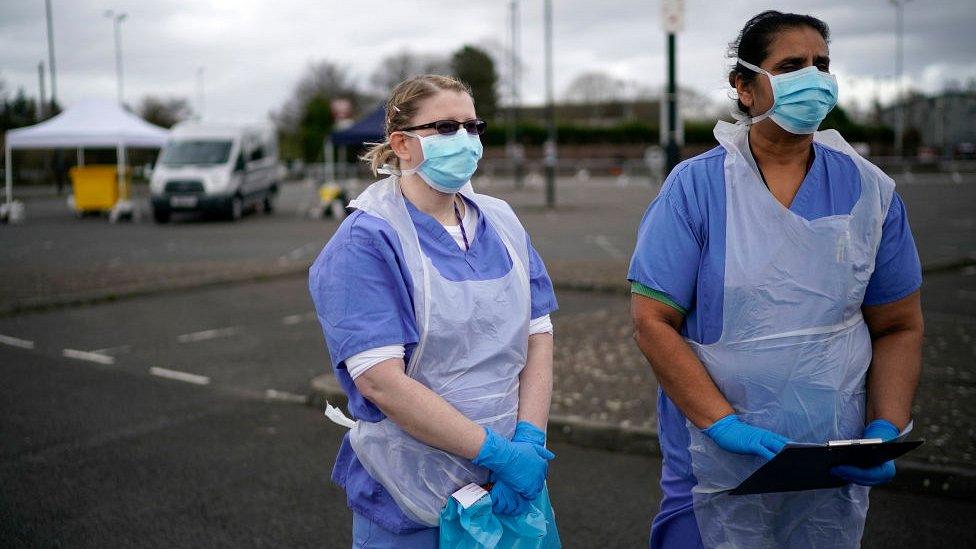Covid: NHS staff testing 'dismantled' in virus hotspots
- Published
- comments

A number of NHS trusts stood down in-house coronavirus testing for staff in the summer, ahead of a surge in virus cases, a health leaders' body says.
This followed assurances from government about the capacity of the centralised system, it is understood.
But it left some staff, including in virus hotspots, unable to access testing when the national system came under strain earlier in the autumn.
The government has since said it has increased testing capacity.
The Department of Health and Social Care (DHSC) is also extending regular testing to some NHS staff without symptoms.
At the start of the pandemic, "a lot of trusts pulled together their own [makeshift] testing schemes because they really needed to test staff", said Saffron Cordery, deputy chief executive of NHS Providers, the body which represents health trust leaders in England.
But as a centralised national system developed, many trusts "stood down" their testing arrangements put in place in the first months of the pandemic, she said.
How do I get a coronavirus test?
This was partly in response to the "direction of travel from central government".
For example, Blackburn with Darwen and East Lancashire clinical commissioning groups (CCGs) said their staff were currently relying on the public system.
Between April and July, their clinical staff were tested via the local hospital trust.
But this arrangement was "stood down following increased swabbing capacity" in the centralised pillar two system, according to a spokesperson representing areas including Blackburn, Burnley, Hyndburn, Ribble Valley, Rossendale and Pendle - all virus hotspots in recent weeks.
Since then, some trusts have re-instated their in-house testing, but this time they won't be reimbursed for it.
Getting a test
Though NHS staff in large hospitals can generally access tests through their workplaces, many others have had to rely on the public system - referred to as "pillar two" of the testing programme.
Pillar two testing goes through six centralised Lighthouse Labs, and it is this part of the programme that has struggled with capacity over the past month or so.
Pillar one, dealt with in NHS laboratories, is generally for hospital patients and staff.
Community and mental health staff and those at smaller district hospitals are all particularly likely to be relying on pillar two, since they are less likely to be working on a site with its own lab facilities.
Although larger hospitals have been able to test these types of staff working in their local area where they have enough lab capacity, patients and their own staff are given priority.

From late August, through the autumn, the government was forced to restrict the public "pillar two" element of the testing regime in parts of the country, after rising demand meant labs couldn't keep up. This meant many people, including NHS staff, have struggled to get tests.
Now, matters appear to have improved, but three-quarters of people who get tests are still waiting more than 24 hours for a result.
And recent documents published by the government's scientific advisers stated said the NHS Test and Trace system was having only a "marginal impact" and this would "likely decline further", in part because of these delays.
The BBC spoke to people trying to get tests at a centre in Oldham
Public health experts have argued summer was when the nation should have been building, not reducing, testing capacity.
NHS Providers added things had improved considerably in recent days, though, through "herculean" efforts to ramp up testing.
The Department of Health and Social Care (DHSC) said pillar two of the testing system was currently running at its maximum safe capacity of 85%, but testing in NHS labs was running at a lower capacity of 65% meaning there was room to increase numbers.
Because of this, NHS labs have begun to process some of the public tests to ease the strain on the system.
A DHSC spokesperson said: "Since the beginning of this pandemic we have prioritised testing for health and care workers to ensure all NHS staff have consistent access".
"This is provided through pillar one testing in NHS settings where there is growing capacity within trusts to ensure staff can get tested. In addition to this, NHS staff with symptoms continue to be able to access testing via pillar two as a priority."
Follow Rachel on Twitter, external